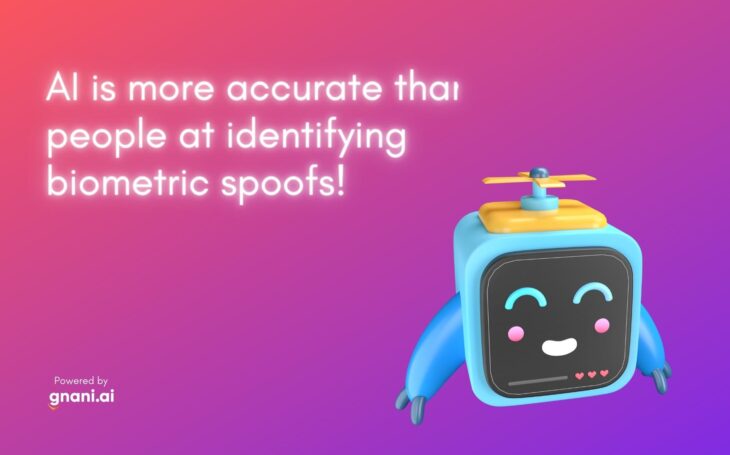
The increasing use of AI for biometric identification has led to concerns about security and privacy. However, AI may actually be able to improve the accuracy of identification. A recent study found that AI is more accurate than people at identifying spoofs, or fake versions of biometrics such as fingerprints or iris scans. The study found that AI was able to correctly identify spoofs in 96% of cases, while humans could only correctly identify them in 61% of cases. This difference is due to the fact that AI can process large amounts of data more quickly and accurately than humans can. This ability to quickly and accurately identify spoofs can have important implications for security. For example, if AI is used to screen passengers at airports, it could help to prevent people with fake passports from boarding flights.
AI might also be able to improve the accuracy of identification in other ways. For example, AI could be used to create better algorithms for matching biometric data. AI could also be used to develop new types of biometrics that are more difficult to spoof.
The increasing use of AI for biometric identification.
AI for biometric identification is likely to have a major impact on security and privacy. AI may help to improve the accuracy of identification and prevent people with fake passports from boarding flights. However, the technology also raises concerns about the potential for misuse. AI will need to be developed and regulated carefully to ensure that it is used in a way that respects people’s rights and privacy. AI plays an important role in biometric identification by providing the ability to process large amounts of data quickly and accurately. In addition, AI can be used to improve the accuracy of biometric data collection by developing new and more effective sensors. As a result, AI is playing an increasingly important role in biometric identification.
The implications of biometrics for security and privacy
The increasing use of AI for biometric identification has led to concerns about security and privacy. However, AI may actually be able to improve the accuracy of identification.
A recent study found that AI is more accurate than people at identifying spoofs, or fake versions of biometrics such as fingerprints or iris scans. The study found that AI was able to correctly identify spoofs in 96% of cases, while humans could only correctly identify them in 61% of cases.
This difference is due to the fact that AI can process large amounts of data more quickly and accurately than humans can. This ability to quickly and accurately identify spoofs can have important implications for security. For example, if AI is used to screen passengers at airports, it could help to prevent people with fake passports from boarding flights. AI might also be able to improve the accuracy of identification in other ways. For example, AI could be used to create better algorithms for matching biometric data. AI could also be used to develop new types of biometrics that are more difficult to spoof.
The use of AI for biometric identification also raises concerns about privacy. AI may be able to improve the accuracy of identification, but it could also be used to collect and store large amounts of data about people’s physical characteristics. This data could be misused in ways that violate people’s privacy rights.
As a result, AI will need to be developed and regulated carefully to ensure that it is used in a way that respects people’s rights and privacy.
Ways in which biometrics might be improved in the future
As the use of AI for biometric identification increases, so does the accuracy with which AI can identify spoofs that people may not be able to catch. The implications of this technology for security and privacy are far-reaching, and ways in which the technology might be improved in the future are being explored. There are several ways in which AI for biometric identification could be improved in the future.
- First, AI could be used to create better algorithms for matching biometric data. AI could also be used to develop new types of biometrics that are more difficult to spoof.
- Second, the use of AI for biometric identification will need to be regulated carefully to ensure that it is used in a way that respects people’s rights and privacy.
- Finally, AI could be used to create better ways of protecting the data that is collected through biometric identification. This data should be stored securely and should only be accessed by authorized personnel.
AI has the potential to improve the accuracy of biometric identification. However, the technology will need to be developed and regulated carefully to ensure that it is used in a way that respects people’s rights and privacy.
Conclusion
The increasing use of AI for biometric identification has led to concerns about security and privacy. However, AI may actually be able to improve the accuracy of identification. AI is more accurate than people at identifying spoofs, or fake versions of biometrics such as fingerprints or iris scans. The study found that AI was able to correctly identify spoofs in 96% of cases, while humans could only correctly identify them in 61% of cases. The ability to quickly and accurately identify spoofs can have important implications for security. For example, if AI is used to screen passengers at airports, it could help to prevent people with fake passports from boarding flights.
AI might also be able to improve the accuracy of identification in other ways. As the use of AI for biometric identification increases, so does the accuracy with which AI can identify spoofs that people may not be able to catch. The implications of this technology for security and privacy are far-reaching, and ways in which the technology might be improved in the future are being explored. There are several ways in which AI for biometric identification could be improved in the future. First, AI could be used to create better algorithms for matching biometric data. AI could also be used to develop new types of biometrics that are more difficult to spoof. Second, the use of AI for biometric identification will need to be regulated carefully to ensure that it is used in a way that respects people’s rights and privacy.
Finally, AI could be used to create better ways of protecting the data that is collected through biometric identification. This data should be stored securely and should only be accessed by authorized personnel. AI has the potential to improve the accuracy of biometric identification. However, the technology will need to be developed and regulated carefully to ensure that it is used in a way that respects people’s rights and privacy.




